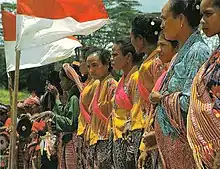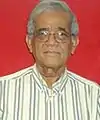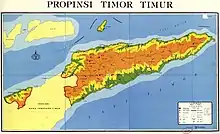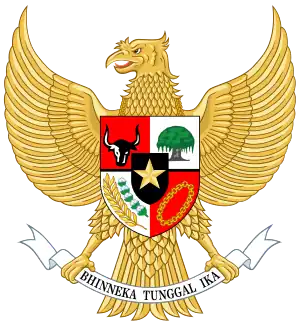East Timor | |||||||||
|---|---|---|---|---|---|---|---|---|---|
| 1976–1999 | |||||||||
| Motto: Houri Otas, Houri Wain, Oan Timor Asswa'in (Tetum) "From the past and from today, we are Timorese warriors" | |||||||||
 Location of East Timor Province | |||||||||
| Status | Province of Indonesia (de facto)[1] Overseas province of Portugal (de jure) | ||||||||
| Capital and largest city | Dili | ||||||||
| Official languages | Indonesian | ||||||||
| Recognised regional languages | Balinese, Fataluku, Javanese, Tetum, Sundanese, Uab Meto, other indigenous languages | ||||||||
| Religion |
| ||||||||
| Government | Overseas province within a unitary semi-presidential constitutional republic, under military occupation (de jure)[1]
Province within a unitary presidential constitutional republic (under a dominant-party authoritarian military dictatorship) (de facto) | ||||||||
| President of Indonesia | |||||||||
• 1976–1998 | Suharto | ||||||||
• 1998–1999 | B. J. Habibie | ||||||||
| Governor | |||||||||
• 1976–1978 (first) | Arnaldo dos Reis Araújo | ||||||||
• 1992–1999 (last) | José Abílio Osório Soares | ||||||||
| Vice Governor | |||||||||
• 1976–1981 (first) | Francisco Xavier Lopes da Cruz | ||||||||
• 1998–1999 (last) | Musiran Darmosuwito | ||||||||
| Legislature | East Timor Regional Representative Council (DPRD Timor Timur) | ||||||||
| Historical era | New Order | ||||||||
| 17 July 1976 | |||||||||
| 12 November 1991 | |||||||||
| 30 August 1999 | |||||||||
| 25 October 1999 | |||||||||
| Area | |||||||||
• Total | 15,007 km2 (5,794 sq mi) | ||||||||
• Water (%) | negligible | ||||||||
| Population | |||||||||
• 1980 | 555,350 | ||||||||
• 1990 | 747,750 | ||||||||
| Currency | Indonesian rupiah (Rp) (IDR) | ||||||||
| Time zone | UTC+8 (Central Indonesia Time) | ||||||||
| Date format | dd-mm-yyyy | ||||||||
| Driving side | left[2] | ||||||||
| Calling code | +62 377 (Viqueque) +62 378 (Pante Makasar) +62 379 (Suai) +62 390 (Dili) +62 394 (Maliana) +62 396 (Lospalos) +62 398 (Ermera) +62 399 (Baucau) | ||||||||
| ISO 3166 code | ID-TT | ||||||||
| Internet TLD | .id | ||||||||
| |||||||||
| Today part of | East Timor | ||||||||
Notes
| |||||||||
East Timor (Indonesian: Timor Timur) was a de facto province of Indonesia that existed between 1976 and 1999 during the Indonesian occupation of East Timor. Its territory corresponded to the previous Portuguese Timor and to the present-day independent country of Timor-Leste.
From 1702 to 1975, East Timor was an overseas territory of Portugal, called "Portuguese Timor". In 1974, Portugal initiated a gradual decolonisation process of its remaining overseas territories, including Portuguese Timor. During the process, a civil conflict between the different Timorese parties erupted. In 1975, Indonesia invaded East Timor and in 1976, it formally annexed the territory, declaring it as its 27th province and renaming it "Timor Timur". The United Nations, however, did not recognise the annexation, continuing to consider Portugal as the legitimate administering power of East Timor. Following the end of Indonesian occupation in 1999, as well as a United Nations administered transition period, East Timor became formally independent of Portugal in 2002 and adopted the official name of Timor-Leste.
Background

From 1702 to 1975, East Timor was an overseas territory of Portugal, lately being officially the Portuguese overseas province of Timor, usually referred as "Portuguese Timor". Following the "Carnation Revolution" of 1974, the new Government of Portugal initiated a gradual decolonization process of its overseas territories, including Portuguese Timor. During the process, a civil conflict between the several Timorese political parties erupted, with the left-wing Revolutionary Front for an Independent East Timor (Fretilin) prevailing and being able to control the capital Dili, obliging the Portuguese governor and his staff to move his seat to the Atauro Island.
On the 28 November 1975, Fretilin unilaterally declared the independence of the then Portuguese Timor, calling it República Democrática de Timor-Leste (Portuguese for "Democratic Republic of East Timor"). Portugal did not however recognize that independence, with the Portuguese governor continuing to be present and formally administering the province from Atauro, although having a limited de facto authority over the remaining territory of East Timor.
Nine days later, Indonesia began the invasion of the majority of the territory of East Timor. Following the invasion, the Portuguese governor and his staff left Atauro aboard two Portuguese warships. As a statement of Portuguese sovereignty, Portugal maintained those warships patrolling the waters around East Timor until May 1976.
On 17 July 1976, Indonesia formally annexed East Timor as its 27th province and changed its official name to Timor Timur, the Indonesian translation of "East Timor". The use of the Portuguese language was then forbidden, as it was seen as a relic of colonisation.
The annexation was recognized by a few countries, the most relevant being the United States and Australia, but was not recognized by Portugal, the majority of other countries and the United Nations. The United Nations continued to recognise Portugal as the legitimate administering power of East Timor.
The Indonesians left in 1999 and East Timor came under the administration of the United Nations.
After the re-establishment of the independence of Timor-Leste in 2002, the East Timorese government requested that the name Timor-Leste be used in place of "East Timor". This is to avoid the Indonesian term and its reminder of the Indonesian occupation.
Government
As with all provinces of Indonesia, executive authority was vested in a Governor and Vice-Governor elected by the Regional Representative Council (Dewan Perwakilan Rakyat Daerah, DPRD) every five years. Legislative authority was vested in the DPRD, both in province and regency level.
Governors
Below are governors of East Timor Province from 1976 to 1999:
| No. | Portrait | Officeholders | Tenure | Notes | Head of state (Term) | |
|---|---|---|---|---|---|---|
| From | Until | |||||
| 130 |  |
Arnaldo dos Reis Araújo Governor |
3 August 1976 | 19 September 1978 |  Suharto President of Indonesia (27 March 1968 – 21 May 1998)  B. J. Habibie President of Indonesia (21 May 1998 – 20 October 1999) | |
| 131 |  |
Guilherme Maria Gonçalves Governor |
19 September 1978 | 17 September 1981 | ||
| 132 |  |
Mário Viegas Carrascalão Governor |
18 September 1981 | 18 September 1992 | ||
| 133 |  |
José Abílio Osório Soares Governor |
18 September 1992 | 19 October 1999 | ||
Regional Representative Council
Composition of the Regional Representative Council between 1980 and 1999:
| Regional Representative Council of Timor Timur | |||||
| Year | PPP | Golkar | PDI | ABRI | Total |
| 1980 | 0 | 25 | 0 | 0 | 25 |
| 1981 | 0 | 24 | 0 | 0 | 24 |
| 1982 | 0 | 32 | 0 | 4 | 36 |
| 1987 | 0 | 34 | 2 | 9 | 45 |
| 1988 | 0 | 34 | 2 | 9 | 45 |
| 1989 | 0 | 33 | 2 | 9 | 44 |
| 1990 | 0 | 34 | 2 | 9 | 45 |
| 1991 | 0 | 34 | 2 | 9 | 45 |
| 1992 | 2 | 29 | 5 | 9 | 45 |
| 1997 | 1 | 30 | 5 | 9 | 45 |
Administrative divisions

The province was divided into thirteen regencies (kabupaten) and one administrative city (kota administratif). These are listed below along with their districts (kecamatan), per December 1981:[1][2]
- Dili Administrative City, served as the capital of East Timor, also the capital and part of Dili Regency, consisted of East Dili (Dili Timur) and West Dili (Dili Barat) districts, which formerly belonged to Dili Regency before the creation of the administrative city status in November 1981.
- Dili Regency, consisted of Dili Administrative City, Atauro and Metinaro districts.
- Baucau Regency, with its capital at Baucau, consisted of Baucau, Vemasse, Laga, Baguia, Venilale, and Quelicai districts.
- Manatuto Regency, with its capital at Manatuto, consisted of Manatuto, Laclubar, Barique, Laclo, and Laleia districts.
- Lautem Regency, with its capital at Lospalos, consisted of Lospalos, Luro, Iliomar, Lautem, and Tutuala districts.
- Viqueque Regency, with its capital at Viqueque, consisted of Viqueque, Ossu, Uato-Lari, Lacluta, and Uato-Carbau districts.
- Ainaro Regency, with its capital at Ainaro, consisted of Ainaro, Maubisse, Hatu-Bullico, Hato-Hudo, and Mape districts.
- Manufahi Regency, with its capital at Same, consisted of Same, Alas, Fato-Berliu, and Turiscai districts.
- Kova-Lima Regency, with its capital at Suai, consisted of Suai, Tilomar, Fohorem, Fatu-Lulic, and Fatu-Mean districts.
- Ambeno Regency, with its capital at Pante-Makassar, consisted of Pante-Makassar, Oe-Silo, Nitibe, and Passabe districts.
- Bobonaro Regency, with its capital at Maliana, consisted of Maliana, Bobonaro, Lolotoi, Atabai, Balibo, and Cailaco districts.
- Liquica Regency, with its capital at Liquica, consisted of Liquica, Bazar-Tete, and Maubara districts.
- Ermera Regency, with its capital at Gleno, consisted of Ermera, Atsabe, Hatolia, Lete-Foho, and Railaco districts.
- Aileu Regency, with its capital at Aileu, consisted of Aileu, Remexio, Laulara, and Lequidoe districts.
Gallery
 The East Timor Museum (formerly East Timor Pavilion) in Taman Mini Indonesia Indah which was built in 1980 (by then, East Timor was part of Indonesia); depicted here is its traditional house.
The East Timor Museum (formerly East Timor Pavilion) in Taman Mini Indonesia Indah which was built in 1980 (by then, East Timor was part of Indonesia); depicted here is its traditional house.
See also
References
- ↑ "Peraturan Pemerintah Republik Indonesia Nomor 19 Tahun 1976 tentang Pemerintahan Propinsi Daerah Tingkat I Timor Timur dan Kabupaten-Kabupaten Daerah Tingkat II di Timor Timur". Act of 30 July 1976 (in Indonesian). Retrieved 30 June 2022. Archived 30 June 2022 at the Wayback Machine
- ↑ "Peraturan Pemerintah Republik Indonesia Nomor 41 Tahun 1981 tentang Pembentukan Kota Administratif Dili". Act of 19 November 1981 (in Indonesian). Retrieved 30 June 2022. Archived 30 June 2022 at the Wayback Machine

